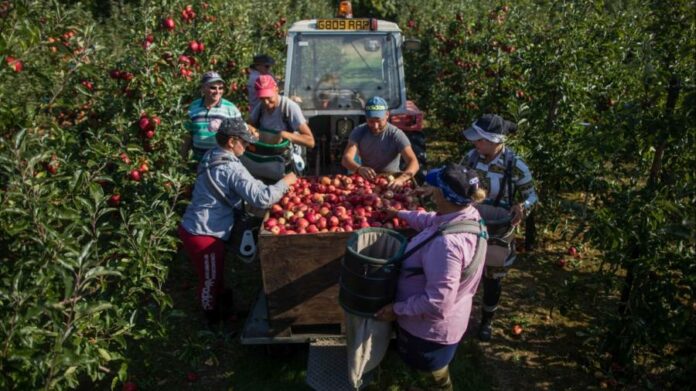The UK’s leading supermarkets have formed a task force that will fund independent audits on British farms after investors called on food retailers to eliminate the risk of worker exploitation in their supply chains.
The move from grocers including Tesco, Sainsbury’s, Ocado and Waitrose, follows widespread reports that Asian agricultural workers had come to the UK after paying exorbitant fees to hiring agencies in their home countries, leaving them effectively working to pay off debts.
The grocers told suppliers last week that they will fund audits of the UK-based recruitment companies licensed to hire seasonal labourers, which will involve surveys of workers on farms, according to a letter seen by the Financial Times.
Stronger Together, the ethical recruitment group leading the audit process, confirmed that the aim is to assess the recruitment process by UK agencies and their counterparts abroad, rather than conditions on the farms themselves.
The supermarkets, which also include Aldi, Co-op, Asda and Morrisons, said in their letter that “the task force is working to develop and implement tangible actions to help mitigate risks of worker exploitation” and “to improve worker welfare”.
The controversy surrounding migrant farm workers has added to pressure on UK businesses and the government as they face a shortage of foreign workers. Growers, which in the past relied on temporary workers from Europe, have been forced to look farther east post-Brexit and since Ukraine was invaded by Russia.
Campaigners have warned that labourers from Nepal and Indonesia, who made up 18 per cent of seasonal workers in 2022 up to August, would struggle to pay back loans that they took out after being charged thousands of pounds by recruiters in their home countries.
As a result, British recruiters for the seasonal worker scheme have now ruled out hiring from these Asian countries, deepening the risk of labour shortages this year.
In December, investors with £800bn in assets, including shareholders in big supermarkets, called on retailers to eliminate the risk of exploitation and ensure workers are repaid the millions that they are estimated to have collectively spent to secure jobs.
This followed a report by the Independent Chief Inspector of Borders and Immigration that found the government “did not act promptly or seriously” when workers reported “serious concerns”.
Debt bondage is recognised by the International Labour Organization as an indicator of forced labour, and the charging of recruitment fees is opposed by UN principles backed by the UK.
The efforts by the supermarkets “cannot and shouldn’t replace the government’s role”, said Andy Hall, an independent activist who has campaigned on issues around the seasonal worker scheme.
“The fact [that the private sector is arranging audits] is a good thing in response to the government’s lack of action.” He added, however, that his focus was “the remediation [of former workers]”.
Sophie De Salis, sustainability policy adviser at the British Retail Consortium, which represents the supermarkets, said that retailers are “committed to upholding high standards of welfare for all people who work in their supply chains”.
But she said that supermarkets needed an intervention from the government and licensed recruiters to address the “systemic challenges within the design, operation and enforcement of the seasonal worker scheme” and to “better protect workers vulnerable to illicit recruitment fees”.
A government spokesperson said that the welfare of workers “is always of paramount importance for us”. They added that the government works closely with the licensed recruiters “who have responsibility for ensuring the welfare of migrant workers, preventing zero hour contracts and managing the recruitment process overseas”.
They said the government “will always take decisive action” if these recruiters do not meet its conditions.






